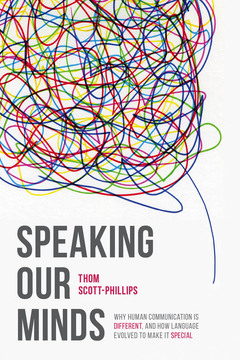Description
Speaking our minds, 2015
Why human communication is different, and how language evolved to make it special
Author: Scott-Phillips Thom
Language: English
Subject for Speaking our minds:
193 p. · 15.5x23.5 cm · Paperback
Withdrawn from sale
Description
/li>Contents
/li>Biography
/li>Comment
/li>
Drawing on a range of disciplines including cognitive science, linguistics, anthropology and evolutionary biology, Speaking Our Minds explains how language evolved and why we are the only species to communicate in this way.
Written by a rising star in the field, this groundbreaking book is required reading for anyone interested in understanding the origins and evolution of human communication and language.
1. Two Approaches to Communication.- 2. The Emergence of Communication Systems.- 3. Cognition and Communication.- 4. The Evolution of Ostensive Communication.- 5. Crossing the Rubicon.- 6. Evolutionary AdaptationEpilogue: The Big Questions Answered.
Groundbreaking graduate-level text that explores the big questions behind the evolution of language
Its focus on several interrelated disciplines from psychology to anthropology to linguistics makes it a relevant text for a wide range of students and researchers
Written accessibly




